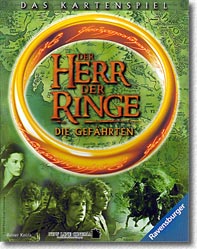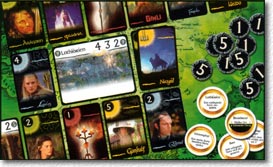Print this review
Der Herr der Ringe - Die Gefährten
The Card Game

Publisher: Ravensburger
Author: Reiner Knizia
Tester: Aaron Haag
Game Tested: 2001 release
Scenario: Frodo and his friends Sam, Merry and Pippin flee through the towns of
Middlearth to prevent Sauron from taken the ring back from him. Two to four players play
character cards for each town in order to receive victory points.
The Game: Although designed by the same author this game is not an extension or
sequel to the "Lord Of The Rings" game series published by Kosmos/Hasbro. In
fact, there is very little reference in the game mechanics to the Lord of the Rings theme
and one may assume that Ravensburger decided to use the current LotR hype for marketing
reasons only as the game itself is an abstract card-laying game. The cards use
photographs of characters of the LotR movie and this may explain the relatively high
price.
Up to four players use identical sets of 22 cards to gain control over 10 towns of
Middlearth. To do this players in sequence place cards next to the two cards representing
a town from their hand.  Of the 22 cards each player receives 6
randomly drawn cards. Once all ten spaces surrounding a town are occupied players earn
points depending on their relative strength in that town. Each character card has a value
between 0 and 5. Players may play any number of cards valued 1 or one higher
valued card. The one card with value 0 and the Nazgûl may be played in addition. All
character card values of a player on the cards bordering the currently scoring town are
added up and the top scoring players receive the victory points printed on the town card.
Additionally, some towns provide a "ring" to the strongest player. Such a ring
may be used in subsequent turns to protect a character just played. In addition most
rings provide special powers that influence the character cards played in a town or the
town itself.
Of the 22 cards each player receives 6
randomly drawn cards. Once all ten spaces surrounding a town are occupied players earn
points depending on their relative strength in that town. Each character card has a value
between 0 and 5. Players may play any number of cards valued 1 or one higher
valued card. The one card with value 0 and the Nazgûl may be played in addition. All
character card values of a player on the cards bordering the currently scoring town are
added up and the top scoring players receive the victory points printed on the town card.
Additionally, some towns provide a "ring" to the strongest player. Such a ring
may be used in subsequent turns to protect a character just played. In addition most
rings provide special powers that influence the character cards played in a town or the
town itself.
The player who placed the card which initiated the scoring of a town is the first
player to place a new town on the table. The two cards of the new town must be placed
next to each other and next to already placed character cards. This means that characters
can score twice in a game. It is therefore a considerable advantage to place the last
card for a town because only then one is able to place the new town cards in a favorable
position.
Some towns (black) are more dangerous than others (white) because in black towns
stronger character cards may be placed on top of already played cards. And there is the
Nazgûl card of which each player has exactly one. The Nazgûl is used to remove an already
played card from the table. Frodo (value 3) is however always protected by the ring
against being covered up or being removed.
The game ends when either the last (tenth) town has been completed or all but one
player have run out of cards.
Playing Time: The game can be explained in about 5 minutes. Playing time is 20
to 45 minutes.
Similar Games: Samurai, Corruption
Westpark Gamer's Opinion: Besides the fact that the game's atmosphere
bears no resemblance to LotR whatsoever, which may disappoint players looking exactly for
this, "Die Gefährten" is not a bad game at all. Due to the nature of card games
there is an element of luck but the game mechanics provide sufficient room for tactics
and timing. I personally believe that the game is rather more complex than one may think
after one has played it just once or twice - a typical Knizia so to say.
The victory points per town vary from the lesser valued towns (5 points total plus 1
rings) in the beginning to the higher valued towns (13 points) towards the end of the
game. Some careful resource management with respect to character cards is asked for here.
It is also quite important to keep an eye on the card layout on the table. First, this
provides valuable information about the cards other players are still able to play;
secondly, one must avoid that one player gains many "high-valued" sides for
placing new towns and thirdly, the edge of the table is often approaching faster then one
may think. It is a good idea to agree beforehand how this last situation is dealt with -
either towns may only be placed where it is possible to play all character cards (not
quite to the rules though) or the cards are shifted on the table (not as easy as it
sounds). On smaller tables I suggest you move to the floor anyway.
"Finishing" a town by placing a card on the last free space is of a
considerable advantage in this game. On the one hand it enables a player to tip the
scales in this town by playing a high valued card and gaining higher victory points and
on the other hand it enables a player to decide upon the location of the next town. This
"double scoring effect" is what makes the game rather complex and which forces
the players to carefully think and plan ahead. As a consequence there may be very little
player interaction and a lot of thinking and calculating in a group of
"serious" gamers.
Aaron's Rating: 6 (out of 10)
Westpark Gamers' Rating: 4
| Links to further information: |
Funagain's page about Der Herr der Ringe - Die Gefährten |
|
Luding link for Der Herr der Ringe - Die Gefährten |
 Of the 22 cards each player receives 6
randomly drawn cards. Once all ten spaces surrounding a town are occupied players earn
points depending on their relative strength in that town. Each character card has a value
between 0 and 5. Players may play any number of cards valued 1 or one higher
valued card. The one card with value 0 and the Nazgûl may be played in addition. All
character card values of a player on the cards bordering the currently scoring town are
added up and the top scoring players receive the victory points printed on the town card.
Additionally, some towns provide a "ring" to the strongest player. Such a ring
may be used in subsequent turns to protect a character just played. In addition most
rings provide special powers that influence the character cards played in a town or the
town itself.
Of the 22 cards each player receives 6
randomly drawn cards. Once all ten spaces surrounding a town are occupied players earn
points depending on their relative strength in that town. Each character card has a value
between 0 and 5. Players may play any number of cards valued 1 or one higher
valued card. The one card with value 0 and the Nazgûl may be played in addition. All
character card values of a player on the cards bordering the currently scoring town are
added up and the top scoring players receive the victory points printed on the town card.
Additionally, some towns provide a "ring" to the strongest player. Such a ring
may be used in subsequent turns to protect a character just played. In addition most
rings provide special powers that influence the character cards played in a town or the
town itself.